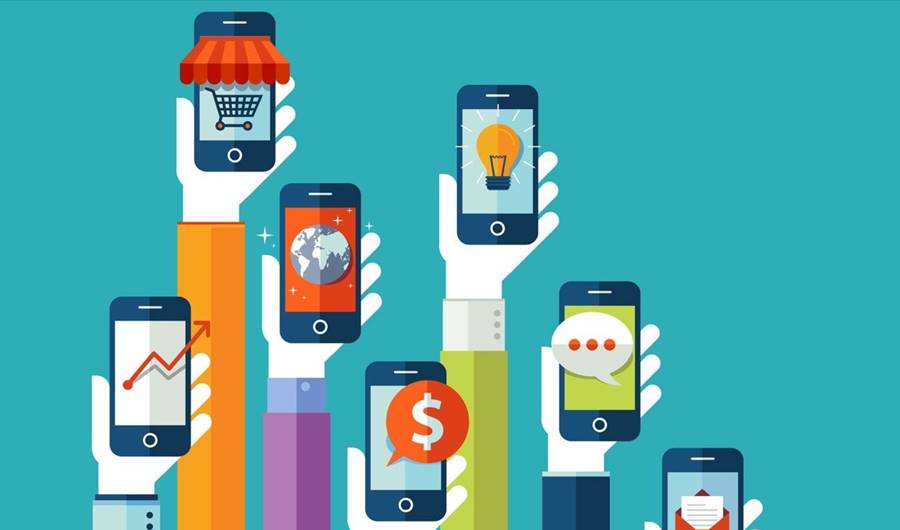There are plenty of obvious reasons to develop an app – it’s a great way to put whatever services or products you offer in front of your customers without them having to visit your website.
The thing is, the convenience of using your shop or service is just one of the benefits that come with having an app – and in fact, there are plenty more than might not be immediately obvious.

Here, we’ll explore some of the ‘hidden’ benefits that developing an app can bring to your business – from increased brand awareness to rarely-thought-of pay-per-click opportunities.
You’re building a direct marketing channel
It’s a feature that very few app developers take full advantage of – but any smartphone user will know all about push notifications.
Push notifications are an SMS style notification that appears on the user’s phone – generally, as a banner on the lock screen or as a pop-up if the phone’s unlocked.
This kind of push-notification isn’t just a message though – when clicked, it delivers your potential customer directly to whichever part of your app you desire – whether that’s a specific product, a contact form, or simply a promotional landing page.
The benefits of this are enormous – and, as long as you don’t overdo it, it’s a great way to directly market to your app users.
Firstly, app users want to hear from you – they wouldn’t have downloaded your app otherwise. So, when you pop up in their notification tray, you can be fairly confident they’re going to be interested in what you have to say. The other big benefit is the huge open rates that are associated with this type of marketing. A 14% open rate and 5% click through rate would be impressive with an email campaign – but with push notification, an ‘open’ is a click-through – and you can expect somewhere in the region of 39% of customers to follow the link you provide.
With customer intent already high, this level of click-through can bring some really serious returns. Remember though – don’t overdo the communication – phone manufacturers are making it easier and easier to turn off irritating notifications, so keep notifications fairly few and far-between for maximum effect when they do hit home.
You can encourage repeat business
People are lazy – and that’s great news for businesses who develop apps.
Now, don’t misunderstand, we’re not being disparaging about the human-race here – we’re just pointing out that if there’s a way to take a shortcut, smartphone users will generally take it. Who wants to remember a URL when you can click a hyperlink? Or who wants have to remember to keep checking your e-commerce store to see if the item they want is back in stock?
If you rely on customers taking action, you’re going to see conversion rates drop dramatically – and it’s because, when it comes to digital experiences, we’re a lazy bunch.
So, how can an app help work around this problem?
For an answer, it’s worth looking at apps like Amazon, Zara, Asos – and other major e-commerce businesses.
These platforms have created such incredible user experiences that customers come back again and again, even if they’re not the cheapest options online. Most consumers value a quick retail experience – and if your UX allows them to enter your business, carry out the function they require quickly, then leave knowing their order is complete, you’re onto a winner.
One of the best ways to do this is to allow customers to quickly and very simply make an account with you. This creates a double win for the customer. Not only do they get to use your app to quickly get what they need – they also don’t have to deal with the hassle of entering new payment details with a new retailer.
Of course, you don’t have to rely on customer laziness to encourage repeat visits and business – you can also give them an incentive to keep coming back.
Some retailers take inspiration from the pay-to-play gaming industry – effectively rewarding customers for use and re-use of their app. San Francisco based Wish do this very effectively. When you use their site, you get a ‘stamp’ on a virtual loyalty card – with continued log-ins creating bigger and bigger discounts on selected products. Log-in for 7 days consecutively and you’ll find you’re unlocking discounts of 40%+ on some products. Whether or not the customers needs these products matters very little – the process of ‘winning’ discounts will keep people coming back for more.
You’ll increase brand awareness
Ever heard of billboard awareness? It might not seem relevant to a business looking at developing an app – but in actual fact, it’s an important part of what makes an app so powerful from an awareness point of view.
Studies suggest that exposure to a brand has almost as much trust-building benefit as a positive experience interacting with the same brand.
For example. If a customer sees your name on a ‘billboard’ 21 times, the familiarity that grows will give the same kind of positive feeling as a successful purchase from your e-commence store or contact with your customer service department.
Both your app and app stores provide this kind of ‘exposure awareness’.
Lets say your customer downloads your app but never opens it. Believe it or not, this isn’t a wasted opportunity – as long as your app is sitting on their phone, their trust in you as a brand is increasing. Likewise, if your app pops up fairly regularly when they’re browsing their relevant app store, trust is also increasing – making them more likely to pick you out as a preferred supplier in the future.
On average, adults pick their phones up 68 times a day – which means they could potentially be scrolling past your app hundreds of times a week. Through sheer exposure, your app and your brand will cement themselves in your customers’ brains as being a positive option – even if they’ve never opened it, used it, or had reason to seek your brand elsewhere. Don’t underestimate the power of simply being seen!













